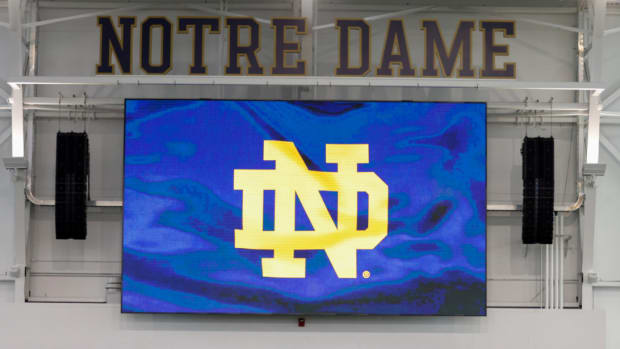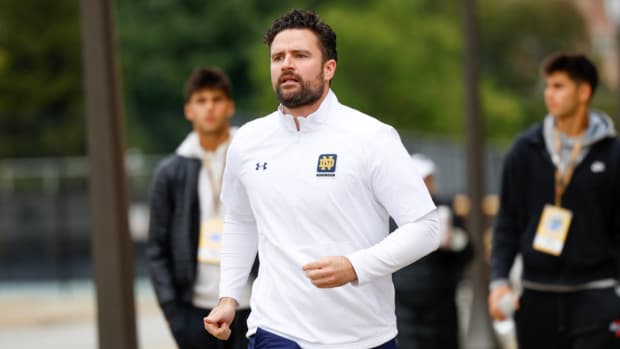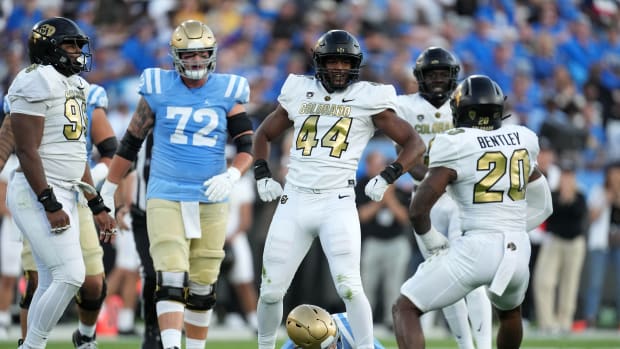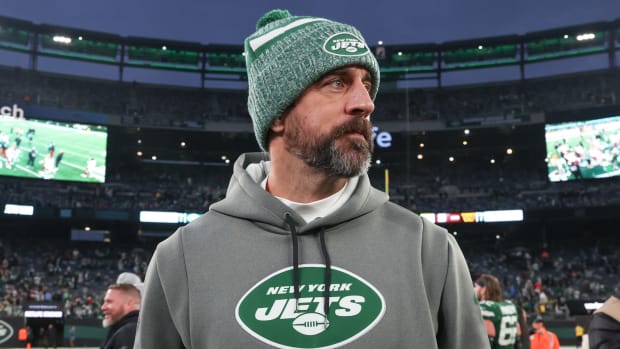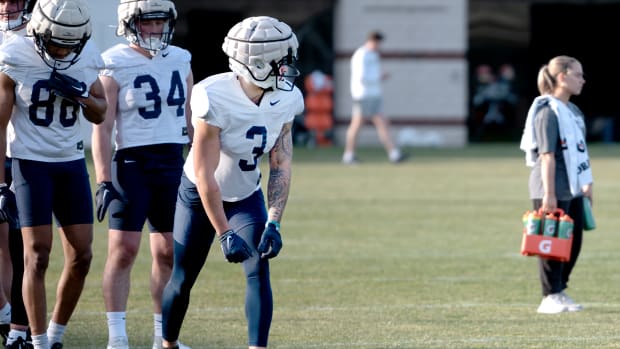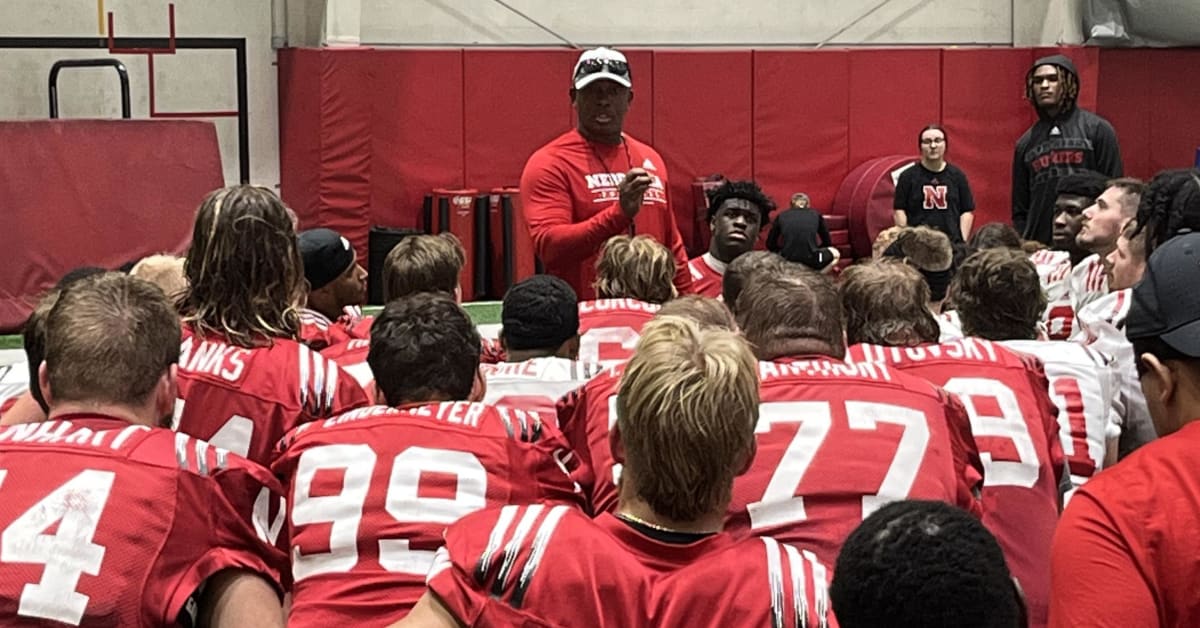
Win or Lose, Mickey Joseph Believes His Time Is Now at Nebraska
Upon arriving in Lincoln, Neb., last December, Priscilla Joseph convinced her husband to take her out on the town for dinner.
While waiting to be seated at a local restaurant, the couple sipped drinks at the bar when a Nebraska fan interrupted them and asked for a selfie. Priscilla thought it was odd—that rarely happened when husband Mickey was the wide receivers coach at LSU for five years.
When they finally followed the host to their table, a man from across the dining room stood from his seat, waved an arm in the air, pointed and exclaimed, “Hey! Mickey Joseph!”
Mickey and Priscilla would later learn the restaurant had stopped seating for dinner a half an hour before they arrived. But in their case, an exception was made—no Lincoln establishment turns down a former Huskers quarterback, especially when he’s making his homecoming.
“Welcome to Nebraska!” Priscilla says with a laugh.
Ten months later, it’s hard to believe Mickey Joseph has gone from receivers coach to interim head coach, taking over what many would argue is the most powerful seat in the state after Scott Frost was dismissed Sept. 11. Joseph is the first Black head coach at Nebraska in any sport, making history at a school that sponsors 23 sports and has fielded a football team for 132 years.
Priscilla won’t be able to convince her husband to go out on the town anymore. No way.
“Oh, you can’t go anywhere,” says Huskers defensive coordinator Bill Busch, a Nebraska native in his third stint on the football staff. “My wife can’t go anywhere without people asking her where I am and what I’m doing.”
Such is life in a state with no major professional sports franchise, a total population akin to the Nashville metro area (1.9 million people) and a terrain of mostly windmills and farm land. Nebraskans are loyal and overly hospitable, resilient and strong enough to survive those harsh winters. And, above all, they love the Huskers, the only Division I football program in the state.
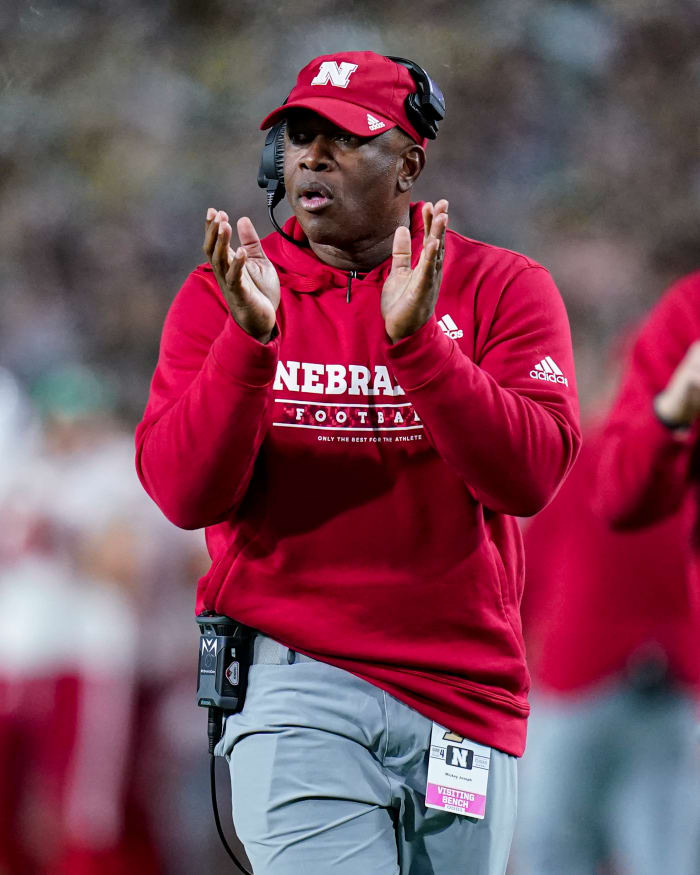
Joseph was elevated to interim coach after Nebraska dismissed Scott Frost on Sept. 11.
Michael Conroy/AP
But since Mickey’s playing days here from 1988 to ’91, much has changed in Lincoln. The city has grown exponentially, as strip malls and chain restaurants rose where corn fields and forested areas once stood. The storied football program has slipped into mediocrity, going from an annual championship contender to a team that hasn’t finished with a winning record since 2016.
“And still, they come,” Joseph says of the fans.
During each Saturday home game, the 90,000-seat Memorial Stadium turns into the state’s third-largest city, and the nation is reminded of Huskers fans’ undying passion for Big Red. The school has had 386 consecutive sellouts—the nation’s longest such streak—which is recognized in the football facility’s main lobby, where three metallic numbers hang on the wall and are manually updated each week. The streak is important enough that, earlier this year, donors bought more than 2,000 unsold tickets to keep it alive.
“All we have is Nebraska football,” says Eric Crouch, the former Huskers quarterback who guided the team to its last conference championship 23 years ago. “This is a part of the people here, their lifestyle and culture.”
The 54-year-old Joseph, roughly halfway through the biggest and longest job interview of his life, is in a pursuit to awaken this giant from its 20-year slumber. His résumé mostly features stops as a position coach at historically Black universities. His meandering career took him from high schools, to an NAIA job in which he presided over a staff of four people, to the SWAC, where just nine years ago he made $37,000 a year while at Alcorn State.
He has taken over what remains one of the best collegiate jobs in the country, for more reasons than just that sellout streak. This loyal fan base also shows their support monetarily. A new $160 million football operations center is in the process of being built to replace a facility that, at most places, would be more than suitable. The school also has enough cash that it elected to pay a $15 million buyout to Frost when it could have waited three more weeks for that figure to drop by half. In this era of name, image and likeness (NIL), Nebraska is believed to be one of the top 10 schools in the country when it comes to athlete pay. Their multimedia rightsholder, Playfly Sports, has pledged more than $2 million to NIL efforts and an assortment of collectives have pooled millions, according to sources.
Joseph is 2–3 as interim coach, with four more games to show he is good enough to land the permanent job. While outsiders doubt he is a legitimate contender, Joseph is heralded by many in Lincoln as having already turned the program around. Fans are excited. Players are energized. And the Huskers, despite a blowout loss against Oklahoma in Joseph’s first game at the helm, are playing better.
“You have resources like this, there’s no way you should be losing,” says Joseph, reclining in the office chair Frost occupied six weeks ago. “You’ve got to measure this program with others around the country. I know this place has just as many resources as we had at LSU.”
Joseph continues pushes toward the future, not knowing for certain he will still be here to see it.
“Everybody wants Nebraska to stay sleeping because we’ve got the resources, and they know I can get players,” Joseph says during a phone conversation from his office last week. “They don’t want this f---er to wake up.”
The first time Vance Joseph returned to New Orleans to introduce his family and friends to his then girlfriend and now wife, Holly, things got off to an awkward start.
“The first two people she met had just got out of prison,” says Vance, former coach of the Denver Broncos and now defensive coordinator for the Arizona Cardinals.
The three Joseph brothers—Mickey, Vance and Sammy—grew up in Marrero, La., a 30,000-person census-designated place just south of New Orleans in what is called the “West Bank.” It is situated on the other side of the Mississippi River from the most popular parts of the city, such as the Garden District and French Quarter. For a span of nearly 20 years ending in 2013, New Orleans averaged over 200 homicides a year. In 2017, the city had the highest rate of gun violence in the U.S., surpassing more populated cities like Detroit and Chicago.
“Most of our buddies didn’t survive it,” Vance says. “They’re dead or went to prison.”
The New Orleans metro area is roughly 51% white and 35% Black. A pseudo-segregated school system still exists, says Rebecca Mark, director of the Center for Academic Equity at Tulane and a longtime resident of the city. “New Orleans responded to desegregation the way many responded to desegregation, which is white flight to the suburbs and the creation of private schools,” Mark says.
Affluent white families traditionally enrolled their children into the private school system, many of them affiliated with Catholicism. A group of Catholic high schools with long-standing football traditions formed the Catholic League in the 1950s. Joseph’s parents—Robert, a contractor, and Linda, a nurse—sought better education for their children and enrolled them at Archbishop Shaw High School. “There were six Black players on the football team,” Mickey recalls.
In sending their oldest son to private school, Robert told Mickey he wanted him to experience the “mixed world.”
“He said, ‘The whole world is not gonna be like this neighborhood,’” recalls Mickey, whose parents still live in the Greater New Orleans area.
Joseph’s friends naturally split into two groups: those from his neighborhood who were poor and Black, and those from his high school who were wealthy and white. His childhood friends are the only ones who still refer to him by his real name: Robert Joseph Jr. It was one of his aunts who gave him the nickname Mickey—his noticeably large ears as a youngster reminded her of the famous mouse.
Hank Tierney, Joseph’s high school coach and a legendary figure in south Louisiana football circles, says Joseph was a “catalyst” in New Orleans for Black players to move from public schools to private schools. Joseph became one of the first star Black players in the league, and his emergence as arguably the nation’s top-ranked high school prospect opened the door for others to follow, such as former Miami defensive end Pat Riley, former NFL safety Ryan Clark and former NFL cornerback Tory James.
“All of a sudden, Mickey turned the corner of the offensive line and went 90 yards and everyone is like, ‘Whoa!’” Tierney says. “‘Where are there more Mickeys?!’”
It came at a cost.
“He’d get crap in games when we’d play white schools,” says Tierney, who is white, “but we had more of a problem when we played the public schools, because it was like he was a traitor.”
Joseph’s college recruitment was a war between two of the country’s best coaches and biggest brands: Barry Switzer and Oklahoma against Tom Osborne and Nebraska. Flash and panache against tried and true. Boomer Sooner vs. Big Red. The fight grew so intense that Osborne and his staff used all of their NCAA-allotted visits ahead of national signing day. When Joseph called to tell them he would be signing with the Huskers and he expected them there for his signing event, Osborne flew to New Orleans for one of the most peculiar signing ceremonies. Joseph sat at one table on the school’s campus, while Osborne and an assistant sat at another table on the other side of a fence that served as the boundary for the campus.
“He handed the letter over that fence,” Osborne says. “We stayed off school property.”
On a recent rainy Monday morning in Lincoln, Osborne and Joseph sat across from one another, this time inside Nebraska’s football facility. They meet each Monday, an arrangement Joseph made with his old coach after taking the interim job. Neither man reveals details of their discussions, but Osborne does offer an evaluation. “From my perspective, Mickey has pushed the right buttons,” he says.
Joseph started just one season for Osborne. It ended in a gruesome sideline incident where he awkwardly slid out of bounds and broke his left leg. He has a scar where the corner of a metal bench punctured the skin and cracked the bone. He was never the same after that, never lived up to his recruiting hype, and still walks with a slight limp.
Maybe that’s part of his motivation as a coach, suggests Tierney. “It didn’t come easy,” he says. “He’s paid his dues.”
Just a decade ago, Joseph was fired despite winning 13 games over two years at Langston University, a historically Black NAIA school in Oklahoma. He and Priscilla packed up a small U-Haul and drove to Lorman, Miss., where he took a nearly 50% paycut to work on a campus so remote the place is nicknamed The Reservation.
But his coaching career started long before that, right in Nebraska, as a quarterback and receivers coach for Omaha North High in 1995. He then moved to Division II Wayne State before returning to Louisiana. He had stops at his old high school, Tulane and Nicholls State before a three-year stint at Desire Street Academy, an all-boys school located in one of New Orleans’s poorest neighborhoods, the Ninth Ward.
A game into his first season, Hurricane Katrina roared ashore, flooded the school and forced its relocation to the Florida panhandle. Joseph acted as a surrogate father to more than 70 displaced boys, many of whom had lost everything, some traumatized by the experience of being trapped for days in the New Orleans Superdome.
“Mickey’s had a chance to move up many times,” Vance says. “He’s never been in a job for the money. He could have been in the NFL seven or eight years ago. I’ve called him four or five times for jobs.
“He just coaches the game. He saves kids’ lives.”
While Joseph left Nebraska as a player hoping to one day return as a coach, he didn’t expect to be in this chair nine months into his homecoming. It’s all been a bit bizarre. Athletic director Trev Alberts, a former Nebraska linebacker, fired Frost, a former Nebraska quarterback, and promoted another former Nebraska quarterback in Joseph.
Priscilla describes the past two months as “chaotic.” The youngest of five children, her parents and oldest sibling crossed the Mexican-U.S. border illegally into Arizona, earned citizenship and went on to have four more children, born and raised in the United States. She played on the Mexican national softball team and currently coaches travel softball. On a recent Sunday morning, Priscilla hurried out of the family’s home for a game while Mickey followed her out the door to his own office. They left their children, 7-year-old Malania and 2-year-old Mickey Reign, with Priscilla’s mother, who was in town visiting.
“It’s hard to have two coaches and two kids,” Priscilla says.
But the move back to Lincoln presented other challenges.
“We got here and, well, it’s all white,” Priscilla says. “I’ve never been in a place dominated by one race. I’m Mexican and Mickey is Black. Our kids are biracial. His brother’s kids are biracial. I’ve never experienced a place like this. You get the looks, yeah, but it’s nothing bad.”
The latest U.S. Census Bureau data indicates that 87.7% of Nebraska’s population is white, an adjustment for a mixed-race family who lived in Louisiana.
“I said to [Malania], ‘Now, you got a lot of kids here that don’t look like you,’” Mickey says. “She was like, ‘They don’t talk like us,’ and I’m like, ‘No, but they’re going to accept you.’ And they have.”
Joseph jokes, “I’ve been a Black coach my whole life,” but says he does understand the significance of this moment.
So does his brother.
“Being the first Black coach in any sport at Nebraska in 2022 is obviously a problem,” Vance says. “It shouldn’t be talked about, but it is talked about because it’s a problem. The world is changing. Sports has been a change agent.”
Entering this season, there were 14 Black head coaches among the 131 FBS teams, a lopsided ratio when considering that roughly 60% of major college football players are Black.

Moving back to Lincoln was an adjustment for the Josephs, including Mickey’s children, 2-year-old Mickey Reign and 7-year-old Malania.
Courtesy of the Joseph Family
“A lot of it is systemic,” says Raj Kudchadkar, executive director of the National Coalition of Minority Football Coaches, a two-year-old organization started by Maryland coach Mike Locksley to promote and groom more minority football coaches.
“I say this all the time, these decision-makers—college presidents and ADs and search firms—they are in those roles for a reason,” Kudchadkar says. “We are all about them hiring the best candidates. Our job is to diversify their applicant pools. We’ve got to get them in front of these decision-makers. It’s all about relationships. People tend to hire who they know.”
Joseph says Black coaches have been somewhat spooked by this place. Osborne reached out to at least two Black coaches while searching for a new head coach when he was AD, but says each declined to be interviewed. Joseph himself recalls being overwhelmed upon arriving here as an 18-year-old from New Orleans.
“It’s different. I came here and it was me and my roommate,” he says. “We got here and were like, ‘Whoa!’ I sat at the end of the bed and was like, ‘I’m out of here.’”
He stayed, of course. And now, 35 years later, he’s in the big chair.
“I always say, you take a kid from down south like New Orleans, and the first white coach he gets is in college,” Joseph says. “Same with the white kids here. I’m the first Black coach some of them have had, you know what I mean? That’s why they want to make it a big thing about me being the first Black coach, but I just want to be a coach to them.
“I’m just a coach.”
Perhaps he is a recruiter first and foremost.
While the benefits of the Nebraska job are great—the loyal fan base, the facilities, the cash on hand—the school does not have a talent-rich recruiting footprint, and its remote location makes it difficult to convince highly touted prospects to move hundreds of miles away. Over the past five years, a combined 10 four- or five-star prospects have come out of the state of Nebraska. In 2022 alone, Louisiana, Joseph’s home state and a high school football hotbed, churned out 18.
The two biggest breaks of Joseph’s coaching career were because of his prowess as a recruiter of New Orleans, one of the top producers of high school football talent in the country. In 2016, Joseph landed his first full-time FBS job as running backs coach under Skip Holtz at Louisiana Tech. A year later, a bigger break came when fellow Louisianian Ed Orgeron was searching for an ace recruiter and receivers coach.
Tierney phoned Orgeron with a recommendation for his former pupil. “‘I don’t wanna hurt your feelings,’” Tierney recalls telling Orgeron, “‘but Mickey Joseph is more popular in New Orleans than you are.’”
Joseph played a significant role in recruiting the talent that helped LSU march to the 2019 national championship, most notably receivers Justin Jefferson and Ja’Marr Chase, two of quarterback Joe Burrow’s top targets who are now excelling in the NFL.
During this season’s coaching transition, Joseph has lost only one committed player and gained a pledge from the state’s top-ranked prospect, Malachi Coleman. (It was significant enough that Joseph inadvertently mentioned Coleman by name earlier this week during a news conference, an NCAA secondary violation the school immediately reported.)
Joseph is feisty about recruiting. Much of his week is dedicated to it. On Sunday, he spends two hours calling high school prospects and their parents. On Mondays, he calls junior college players. On Thursday, he phones high school coaches. During the Huskers’ recent bye week, Joseph and his position coaches hit the road to evaluate talent. They divided up the trips and hit California, Georgia, Illinois, Kansas, Arizona, Texas, Massachusetts and Missouri.
During an hour-long staff meeting Sunday, each coach openly discussed the players they observed, their notes projected on a screen for all to see.
“Offer him! Get him on the phone today!” Joseph announces to the room about one recruit.
“Is he a Day 1 starter?” he asks about another.
“We need f---ing players,” he says toward the end of the meeting. “I’ve never seen a bad coach with players and I’ve never seen a good coach without players.”
Like his team’s performance on the field, Frost’s signing classes dipped his last four years, from 18th in 2019, to 20th in ’20, 25th in ’21 and 32nd this past February. In his last class, Nebraska signed no high school prospects ranked nationally inside the top 30 at their position. The most productive of Nebraska’s 15 transfers, QB Casey Thompson and WR Trey Palmer, were coaxed to Lincoln by Joseph.
“They were taking kids and rushing [the process]. That’s why the roster gets screwed up,” Joseph says. Critics often tell Joseph the only reason LSU won the 2019 national title is because they had really good players. His response: “Well, yeah, that’s what you need!”
“You got to recruit your ass off,” he continues. “We ain’t chasing Iowa, Minnesota and Wisconsin. We are chasing Ohio State.”
Inside the Nebraska football facility, history hangs from the walls and is encased behind glass. Fifty-year-old Orange Bowl posters. Dozens of All-American headshots. Five national championship trophies—three crystal footballs from the 1990s and two made of bronze from the ’70s.
“They want another one of those balls,” Joseph says, tapping on the glass.
First, though, he is attempting to salvage a season and win the permanent job.
To do it, he is following a similar script to Orgeron, who over the years has proved to be adept as an interim coach. He went a combined 11–4 in interim stints at USC and LSU, the latter turning into a full-time job in Baton Rouge.
He’s bringing Oregon’s energy, recruiting acumen and physicality. Change is in the air here. While Orgeron fired LSU’s offensive coordinator, Cam Cameron, upon taking over in 2016, Joseph fired Nebraska’s defensive coordinator, Erik Chinander. He promoted Busch, who was the 2019 LSU staff with Joseph.
Joseph introduced physicality in practice. Under Frost, the Huskers didn’t go full speed and rarely tackled.
“The first practice, I announced that the nine-on-seven portion was live, and they were shocked,” Joseph says. “If you are losing, you can’t keep doing the same thing over and over again.”
The team has shown marked improvement entering this Saturday's home game against Minnesota. But the Huskers (3–5, 2–3) have to win three of their next four games to attain bowl eligibility, a level some believe he needs to reach to win the full-time gig. After the Gophers, Nebraska travels to Michigan, hosts Wisconsin and goes to Iowa.
“Mickey is in a spot where he can be the head coach here,” Busch says.
But how realistic is it, really?
“I can’t even think about another coach,” Crouch says. “If Mickey gets us to a bowl game, they’ve got to really consider him.”
Alberts has mostly been quiet about his search but has been positive about Joseph’s prospects. “I want to salute Mickey Joseph. I am really proud of his leadership,” the AD recently said on his weekly radio show. “The players have really bought in and are fighting.”
That’s no solace. He wants the permanent job.
“You get the job by winning,” Joseph says. “Do we know how many wins? No, but we can make it hard on them.
“People talk about the pressure of the job,” Joseph continues. “Oh, no. I’m from New Orleans. This ain’t no pressure. In the end, it is football. Walk down that street in the Ninth Ward, and that’s pressure.”
Steve Taylor, a former All-American quarterback for the Huskers who is close with the Josephs and lives in Lincoln, believes that 75 percent of the fans want Joseph as permanent coach. Others in the community cite similar support.
“I talk to a lot of people at the country club and golf course. They’re on board with it,” says Taylor, who is Black. “That’s how Nebraska has grown. I think they’re ready for a Black coach. It’s taken three or four head coaches who are white who have failed.”
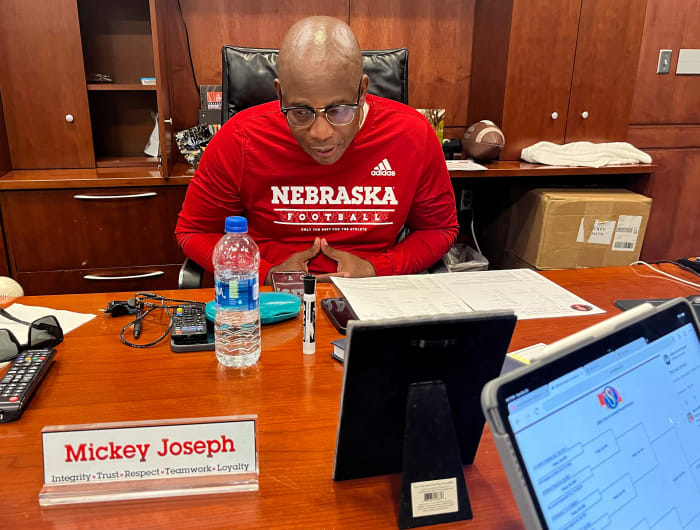
Part of Joseph’s weekly routine is reaching out to high school prospects and their parents.
Ross Dellenger/Sports Illustrated
The school fired Frank Solich and Bo Pelini after 9–3 regular seasons. Bill Callahan and Mike Riley lasted a combined seven years, and Frost, plucked from UCF as the savior of the program, won 16 games and lost 31. This latest renovation is taking the program down to the foundation.
Supporters are frustrated and concerned Nebraska will soon lose a generation of fans, including, Crouch says, his 23-year-old daughter and 18-year-old son.
“It’s not easy for me to talk about this or put it into words,” he says. “I think fans are feeling like something is slipping out of their fingers, and they can’t hold on any longer. There’s a younger generation we don’t want to lose.”
Maybe the answer is already in front of them, toiling away in the Nebraska football facility, another former Huskers quarterback attempting to resurrect Big Red.
“This is a special place for me,” Joseph says. “When I was done playing, it was time for me to go off, but I knew I left this place where I could return here and survive.
“The people here are good people. Nice people. Die-hard fans,” he adds. “They deserve to have a winner, someone to come in and reestablish this program. You never have to worry about nobody not showing up. They are coming. They don’t have much of a choice.”
More College Football Coverage:



